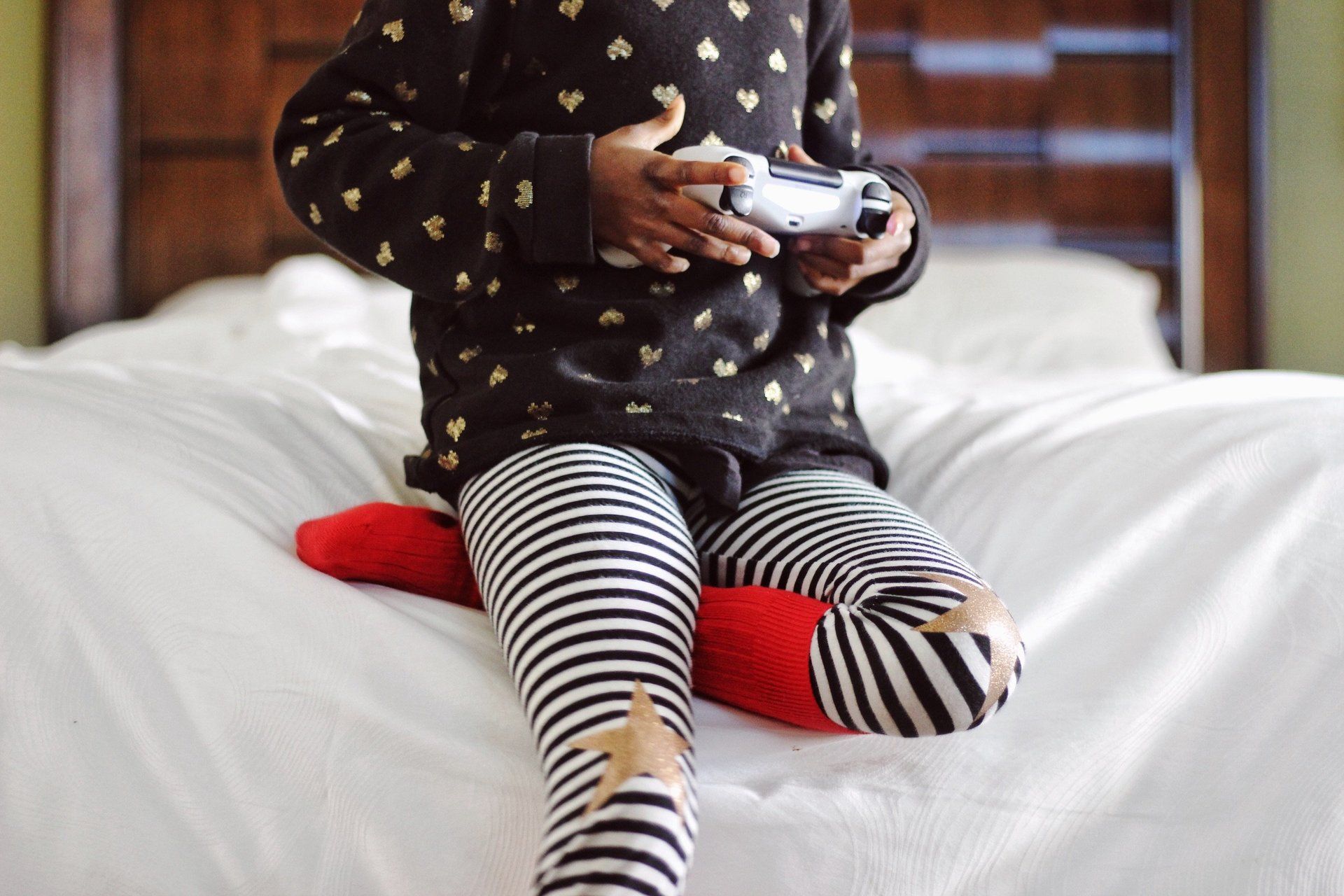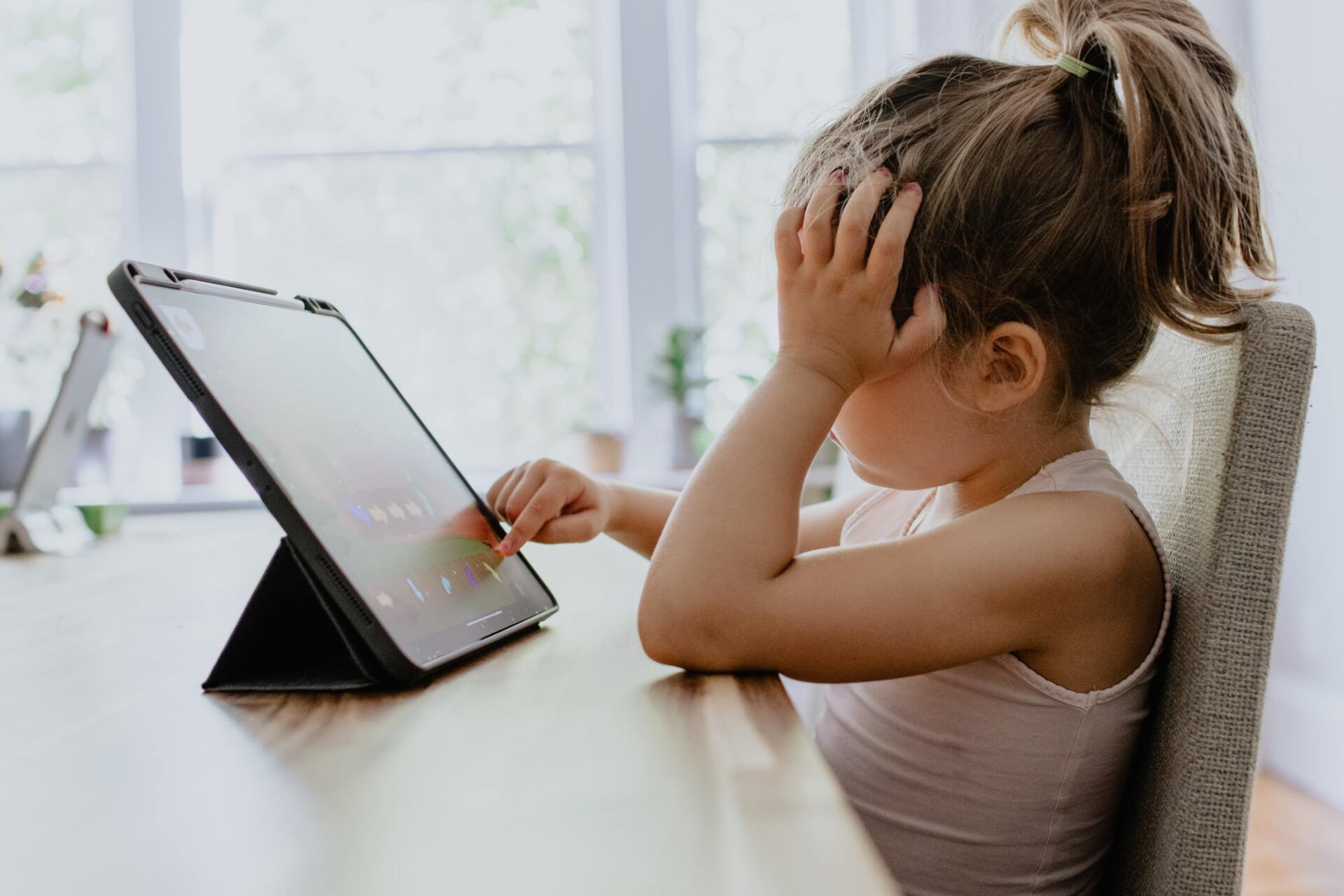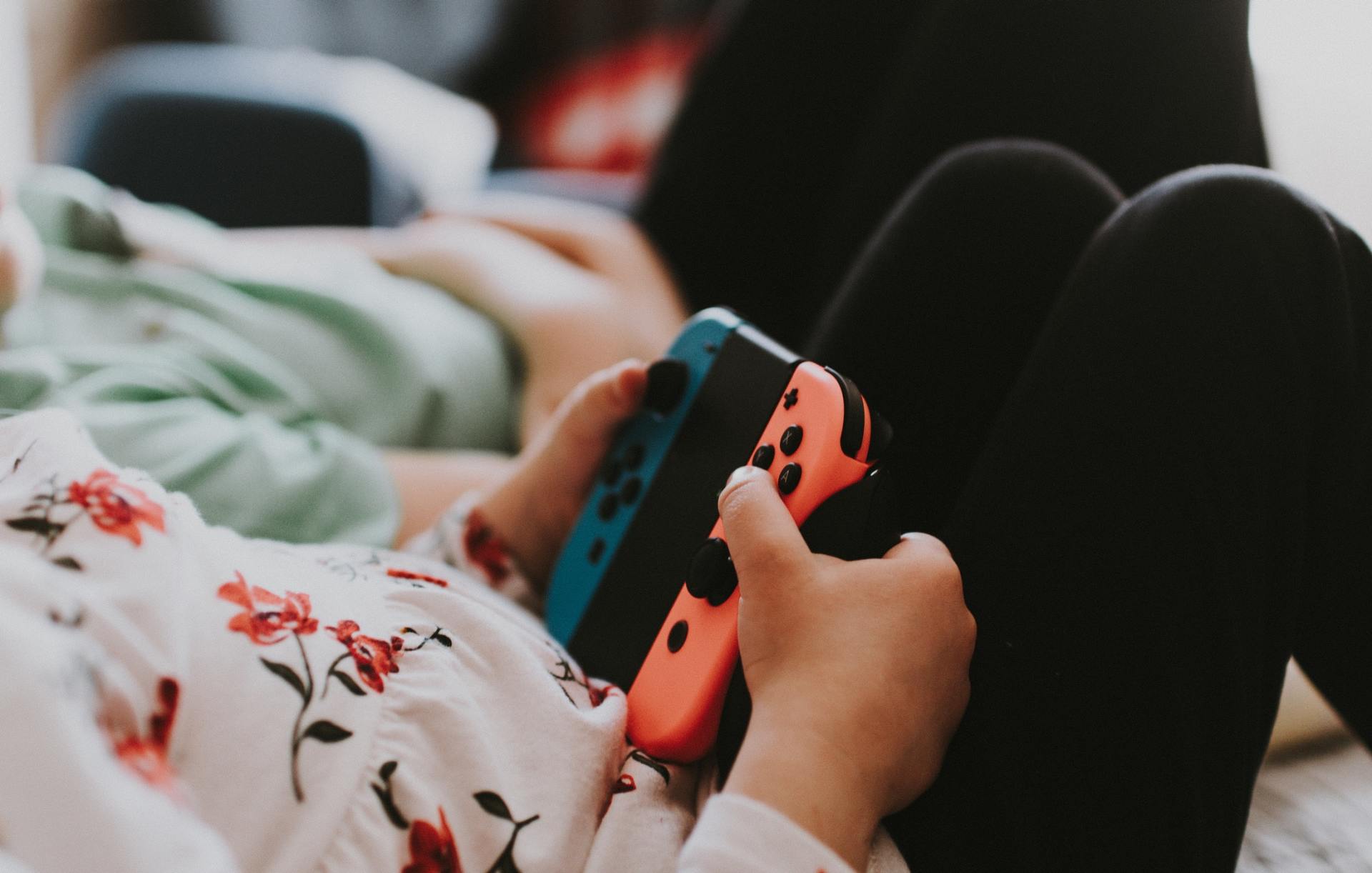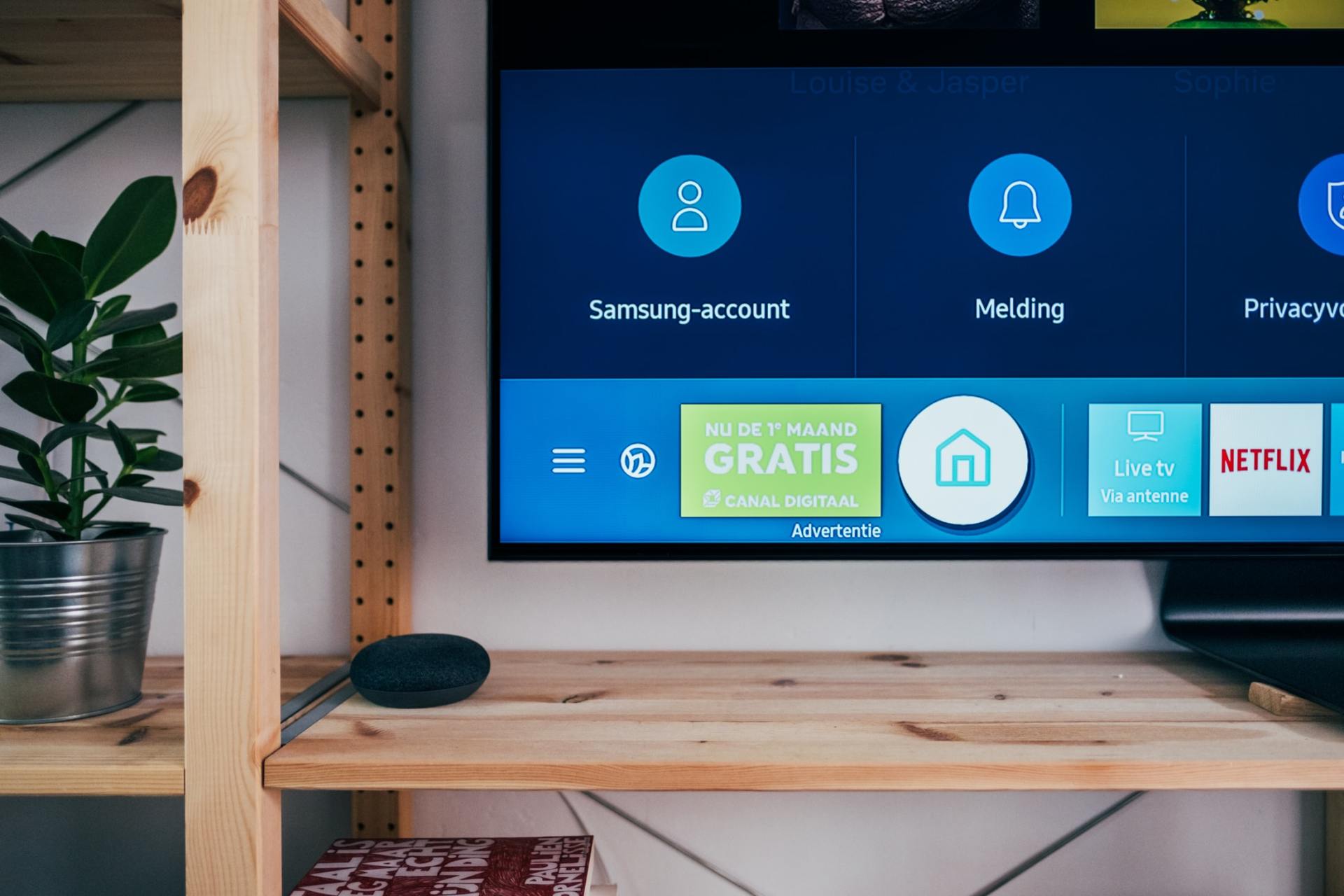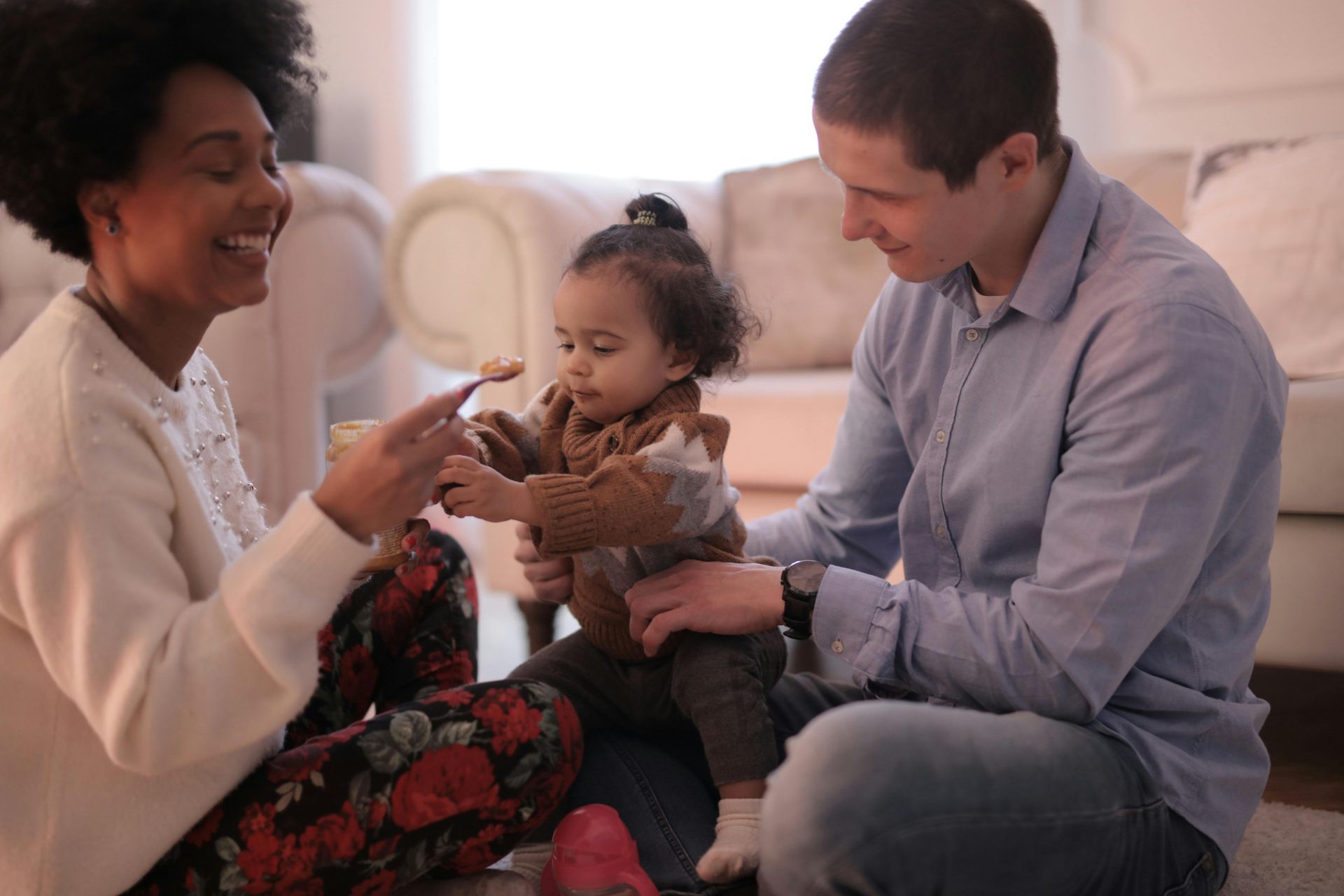Something terrifying happened in my kitchen last week. My daughter hoisted herself halfway onto the counter and reached for a pen against the wall. On her way down, she bumped her elbow, hitting right on her funny bone. She burst into tears.
That wasn't the scary part.
Here's what really shook me up. As she let out her first wail and rounded into a ball in the floor, the first words out of her mouth were, "Mama, can I watch a show?"
Seriously, like mid-scream, the absolute first thing that came into her mind was not physical comfort or emotional support, or even some verbal proclamation of pain. It was TELEVISION.
She's never had that kind of Pavlov's dog reaction before to an injury (thank goodness) and, at first, I kind of brushed it off, but as I started thinking more and more about her relationship with screens, the more I started noticing other kids around me with the same type of subconscious attachment to their devices.
Screen-time and Our Kids
Mind you, I’m well aware of how bad too much screentime is for our kids. I talk about screentime at least ten times per day in well-child checkup appointments in my pediatrics office. I can't count the number of times I've rattled off recommendations about limiting the total amount of time per day parents let their kids use their screens or made suggestions about caring equally about content versus time spent. Families seem to get that too much and the wrong kind of screen use is bad for their kids.
I practice what I preach, too, most of the time—more science shows, less Sophia The First, a heavy emphasis on learning and positive social skill building à la Daniel Tiger.
This, though, was a different part of the technology revolution I'd never even stopped to consider: not only was I letting my child be entertained by screens, I was letting my child be comforted by screens, too. Somewhere along the line, I'd allowed shows and apps and the internet to turn into a security blanket for my kid.
Looking back, I can see where it all started—it's where it starts for most moms and dads. My daughter—sweet, sensitive, and a total monster when she rose from her naps starting around age three—would take at least an hour to break out of her downward post-nap spiral. We would cajole her, try to get her to eat, sing every song in the book and, about thirty minutes into every breakdown, would almost always finally throw on a twenty-minute cartoon to get her to distractedly eat a snack and come back from zombie zone. The screen, because it was on option—and an option that worked well—became a viable option during a time when we didn't know what else TO DO.
As she got older, she phased out of her nap time issues but the screen remained a faithful friend of mine, handy as bait when she didn't want to run errands with me, useful for scary events like a dentist visit, a way to distract when I needed to get her baby sister to bed multiple times a day as an infant. And, the thing is, I didn't even think twice about it. It's not like I let her sit for hours with the blinds drawn every day in front of our TV—far from it—and we definitely knew how to say “no” when she threw a tantrum for more iPhone time.
No, I felt like I had things under pretty good control. Just like almost every other modern mom I meet, I considered the phone a useful tool, one that I was using to keep my busy life in order, to allow everything to run a little more smoothly, to help my daughter get through sticky situations without so much drama.
That, mamas, that is where I
totally missed the point.
After our injury incident, the more I started noticing how dependent my family was on technology. In turn, I realized more and more just what a huge disservice I was doing to my first daughter (and my second) by allowing them to have incremental access to technology throughout their days, ESPECIALLY during times when they were upset, bored, or scared. I realized I was robbing them of the ability to learn how to cope without a crutch when things didn't go their way or when they were uncomfortable. In the end, I was taking away valuable learning and problem-solving opportunities all the time.
Now, I am fully aware that all of this sounds like alarmist rhetoric—like the emotional revelations of an extremist who's decided to live off the grid, forsaking modern conveniences, hauling her TV and her smartphone to the dump. “Let’s not get carried away,” my husband said when I told him I wanted to re-evaluate our screentime plan altogether, limiting our kids’ watching hours to weekly family movie nights, plane rides, and special occasions. I get his concern but, once I started looking further into how technology is changing our kids’ childhood experiences, honestly it’s a little hard to not get carried away with thinking about how much this matters.
"Our culture, in large part, has been influenced by the technological revolution—a series of amazing advancements that have modernized everything from shopping to scheduling doctors’ appointments. But has it all been for the better? It turns out kids who grew up with the technological coming of age (typically born in the early 1990s to mid-2000s —the iGen Kids) are struggling as a result of it," says Dr. Kristen Valerius, a child psychologist and director of Sundstrom Clinical Services.
THE EVIDENCE:
THE RESEARCH BACKS HER UP.
First of all, it shows heavy childhood screen use is ubiquitous:
“…Members of this generation are growing up with a smartphone, have an Instagram account before they start high school, and do not remember a time without the internet. The Millenials grew up with the web as well, but it wasn’t ever-present in their lives, at hand at all times, day and night. iGen’s oldest members were early adolescents when the iPhone was introduced, in 2007, and high-school students when the iPad entered the scene, in 2010. A 2017 survey of more than 5000 American teens found that three out of four owned an iPhone.” says Dr. Jean Twenge, a psychologist and researcher.
Twenge has been analyzing adolescents’ levels of happiness and wellbeing across generations for over 25 years using the Monitoring the Future Survey. The survey, conducted since the mid-seventies, asks 8th, 10th, and 12th graders about their self-esteem, life satisfaction, and daily activities like tech use. Kids, of course, have always had fluctuations in happiness from year to year but in 2012 something astonishing happened: well-being dropped off dramatically. Not just a little drop off. Like, drop off a cliff drop off and it stayed that way. After 20 years of relative stability in overall happiness, life satisfaction, and self-esteem, it went downhill fast…and never recovered. It didn’t matter the kids’ financial situations, they—across the board—seemed to be having a harder time.
So, what happened in 2012? Personal technology use skyrocketed, that’s what happened. In 2012, the year of the huge drop-off, the proportion of Americans who owned a smartphone surpassed 50 percent. Between 2012 and 2015, the percentage of iGen Youth with smartphones went up from 37 to 73 percent. By 2016, 89% had devices. The changes Twenge saw were not based on ethnicity or on social-economic status, nor suburban or rural location. Across the board, no matter what their demographics, suddenly teens were living on their smartphones.
“In all my analysis or generational data—some reaching back to the 1930s—I had never seen anything like it," Twenge said in a 2017 article in The Atlantic.
Of course, no single event, including the advent of pervasive, individualized technology defines a generation. But the dual increase in mental health concerns and media use seem to be strongly connected. We know that factors like heavy social media use, texting, computer games, and accessing the internet are not the keys to a teen’s happiness. In fact, studies show heavy screen use actually decreases happiness, whereas things like sports and in-person social interactions are scientifically proven to improve life satisfaction.
What's So Bad About Kids
Using Screens
It seems we all use our smartphones 24-7, our heads bent down over a small screen, our fingers moving in a perpetual scrolling motion Deep down, I think we're aware it's probably not the best thing for us, no matter what our age. But is there something specifically bad about personal device use for our young kids or for our parenting? YES.
When we allow technology to soothe and entertain our kids, we replace patience with immediacy, we limit our kids' abilities to deal with negative emotions on their own, and we give quick-fix, personalized solutions to boredom, reducing our children's abilities to handle less stimulating environments. We take away the opportunity to develop grit.
As a working mom, my family time is limited throughout the week. In the evenings, I'm tired. On the weekends, I'm always hoping for reduced stress, but with two little ones in tow, that's hardly ever the case. Nothing is worse than coming home from an exhausting day at work only to be inundated with tears and squabbling and strife. It’s extremely hard for modern, stressed-out families to "just say no" to letting screens parent our kids in the name of peace and harmony, but I firmly believe that we have to if we want our children to be resilient and our parenting to be successful.
How Do We Manage Screens and
Mitigate Their Use?
Dr. Valerius gives some powerful suggestions:
1. Deepen Your Genuine Connection with Your Kids
In this modern world, we have to create space to more deeply connect with our kids. It's not going to happen on its own. We have to be intentional about it. Mealtimes, bedtimes, outings, vacations, holiday rituals—when we focus on using these moments as ways to build community and connection, we glean their true value.
2. Help your children build a network of people that know them, including their weaknesses
"True relationship and intimacy come from vulnerably failing and then reconciling, not from being fake or perfect all the time," says Dr. Valerius. When you let your kids experience that kind of transparent connection with others, they learn that they have value no matter what, that they don't have to be perfect to be loved.
3. Learn To Value Negative Emotions and Failure in Your Kids and In Yourself
Dr. Valerius says, “You and your child can have different emotions. Your job isn’t to keep your kids happy or to make them mind perfectly. Your job IS to help them trust they will be okay when happiness comes and goes.”
How do we do that? We let our kids be upset occasionally, we let them work through disappointments, we allow them to experience things not going their way early on so that, years down the road, they can handle life's curve balls with more grace and perspective.
“Anger can build intimacy. Stress can build grit. Belonging and love are built on being forgiven (which requires failing and making it right afterward)," says Dr. Valerius.
3. Limit Tech Use:
- Under age 2- almost nothing
- Over 2 years - less than 2 hours a day (preferably under an hour for elementary school kids) but some days with no screen at all.
- No screens in routine car ride trips or at mealtimes
- No screens in bedrooms (except book readers or music without other apps)
- No personal devices until middle school
- Equally important - screen-free times for parents
It's a New World, Baby
We already live in a world where stressed-out, distracted parenting is the norm and where helicopter parenting threatens our kids' ability to develop problem-solving skills and confidence as they face life's realities.
With all the noise out there about what to do and what not to do as we mold our kids, sometimes it can be hard to determine the real threats to our kids' safety and success. This, my friends, is not one of those times. The evidence is clear: when it comes to screen use—for ourselves and for our kids—we can't be lazy. We have to be a little, dare I say, a little radical. We have to let our kids face micro challenges head-on now so they have a fighting chance at handling macro challenges as teens and adults.
As Dr. Valerius says, “We don’t want kids who never struggle…we want them to know they can handle the struggle.”
My family's screentime dilemmas are not going away anytime soon. Devices are here to stay—for me and for my kids—but I don't have to let them break into our home every other second, invading our lives. With my eye on the future, I'm making a commitment to using screens (as much as possible) as tools instead of trespassers.



